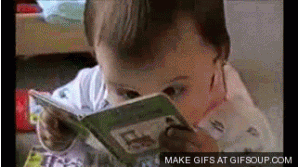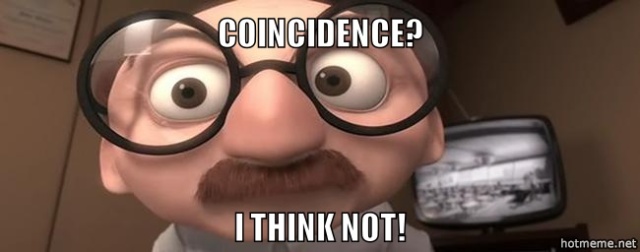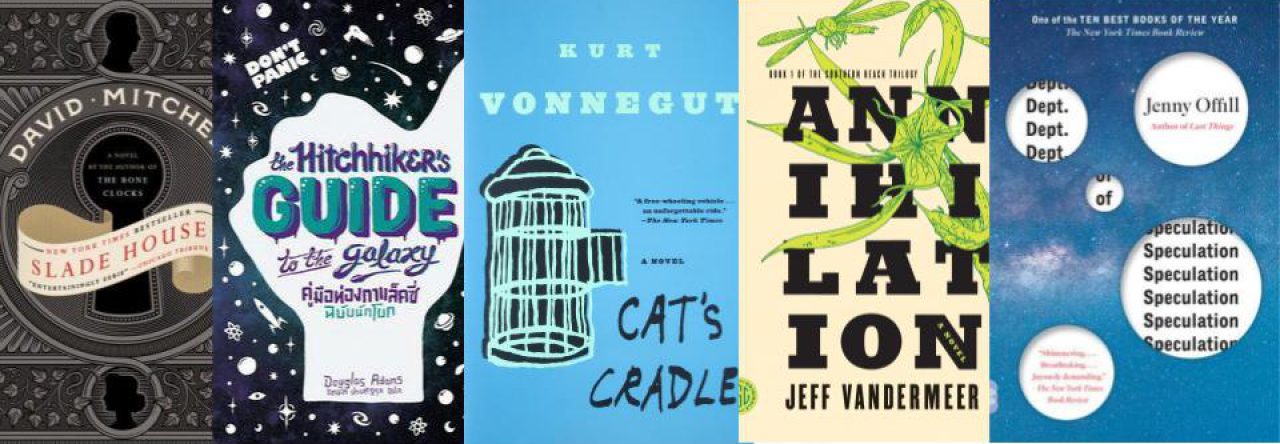In the first blog, it was mentioned that our group came up with a network of controlling values for the book The Hitchhiker’s Guide to the Galaxy:
Purpose: If you adapt to the changing world around you, you will survive.
Context: If you are reluctant to adapt to the changing world, you will not survive.
Purpose: If you stick to your comfort zone, you stay true to yourself.
Context: If you step out of your comfort zone, you may go against your values.
It is a way to look at the main ideas of the narrative as it progresses.
But sometimes it is also good to look at other smaller ideas embedded within the text. This is a method called close reading.

Jane Gallop, in her text, “The Ethics of Reading: Close Encounters”, says that, “Close Reading pays attention to elements in the text which, although marginal, are nonetheless emphatic, prominent- elements in the text which out to be quietly subordinate to the main idea, but which textually call attention to themselves.”
I re-read closely the first fourteen chapters of the book, and just as Gallop said, noticed underlying elements.
To explain these elements, there are five

different forms to choose from:
1) syllogistic progressive form
2) qualitative progressive form
3) repetitive form
4) conventional form
5) minor or incidental forms
The two

that I want to focus on are Minor or Incidental Forms, and Repetitive form.
Minor or Incidental Forms deal with tropes and figures of speech and thought. The main genre of Hitchhiker’s is Science Fiction, and the main trope used throughout, is satire, which is defined by dictionary.com as,
“the use of humor, irony, exaggeration, or ridicule to expose and criticize people’s stupidity or vices, particularly in the context of contemporary politics and other topical issues.”

The specific type of satire in the book is what I like to call the Absurdity of Folly- the quality of being wildly unreasonable and lacking good sense.

In the context of the book, a lot of it involves characters mindlessly applying rules. Here are two prominent examples:
- When the demolition crew came to demolish Arthur’s house to make way for a bypass, he tells Mr.Prosser (the head of the crew) that he hasn’t been notified about it.
Mr Prosser says, “But Mr. Dent, the plans have been available in the local planning office for the last nine months.” (page 8)
These plans have been up for nine months, but they never took the time to inform Arthur when it was relevant. Now that it is time for the house to be demolished, Arthur can’t do much to stop it. It was unreasonable.

- When the Vogons come to destroy Earth to make way for an express route and announce it to the human race, everyone on the planet panics.
The Vogons inform them that, “…All the planning charts and demolition orders have been on display in your local planning department in Alpha Centauri for fifty of your Earth years, so you’ve had plenty of time to lodge any formal complaint…” (page 35)
Just like the last example, it was unreasonable for the Vogons to think that humans would be able to create far-reaching space technology and be able to find the plans in the fifty years that they were up.
If you noticed, these two examples have a lot in common, which is where the Repetitive Form, which is the “consistent maintaining of a principle under new guises”, comes in.
In these first fourteen chapters, quite a few things repeat:
- The Earth getting demolished to make way for an express route is just like Arthur’s house getting demolished by the deconstruction crew to make way for a bypass. The “victims” find out last minute, and the “demolishers” claim to have posted a notice sometime before ( not bothering to actually inform the “victims” in person).
- What would the book be without some hitchhiking? When the Earth is destroyed, Ford and Arthur hitchhike onto the Vogon ship. After they listen to Vogon poetry, they are jettisoned into space, and hitchhike onto the Heart of Gold ship. Each of these events happen right before the two men are about to die.

- The idea of coincidence could also be considered a recurring form. It is a coincidence that Arthur befriends Ford. It is a coincidence that Arthur and Ford are able to be picked up by the Vogon ship at the moment the Earth was destroyed. It was a coincidence that the the Heart of Gold picked up the duo just as they were about to die in the vacuum of space. All of this was highly improbable, and yet they all happened nonetheless (especially the guys being able to hitchhike onto the second ship while it had its very quick Improbability Drive working to travel long distances in a short amount of time.
Another example, which is stated to be coincidence is, “Zaphod Beeblebrox was on his way from the tiny spaceport on Easter Island ( the name was an entirely meaningless coincidence..) to the Heart of Gold Island, which by another meaningless coincidence was named France” (page 37).

These are only a couple of examples from the book highlighting the two forms that I chose to talk about. There are many more examples sprinkled throughout the book, making it a fun experience to find them all. And while I only focused on two forms, the other three forms can also be found if by close-reading the text.
So Don’t Panic, and Keep On Close-Reading!

All GIFs are from giphy.com
URLs:
https: //www.youtube.com/watch?v=Eh-W8QDVA9s
https://www.google.com/search?biw=1268&bih=515&tbm=isch&sa=1&q=freeway&oq=freeway&gs_l=psy-ab.3…291394.292854.0.293171.0.0.0.0.0.0.0.0..0.0….0…1.1.64.psy-ab..0.0.0….0.OqfjJkyRUiw#imgdii=a2N7UksflGzOQM:&imgrc=NlzvYJl2PxN-WM:
https://pbmo.files.wordpress.com/2010/12/peace-sign1.png?w=300&h=344




I like the connection you made between the Vogons that came to destroy earth and the demolition crew that was sent to destroy Arthur’s house. I’m sure you’ll be able to find dozens more examples of irony like that. Specifically, characters who blindly follow rules or social norms are interesting, unless you are Marvin and you hate mechanical doors. I think focusing on the different ways that the characters treat societal rules throughout Hitchhikers would be fascinating and I will definitely give it another read.
LikeLike
Alex, I really like your use of memes and GIFs throughout your post. I feel as though they really portray what you are trying to say and help break up the text. In your post you discuss “close- reading” so I decided to go back to the text and try it out. I focused on chapter 17 pages 123 to 131.
On page 129, I found that Eddie, the computer system of the Heart of Gold, begins singing a song. It goes as follows..
“When you walk through the storm.
Hold your head up high
And don’t be afraid of the dark!
At the end of the storm
Is a golden sky
And the sweet silver song of the lark
Walk on through the wind
Walk on through the rain
Though your dreams be tossed and blown
Walk on, walk on with hope in your heart,
And you’ll never walk alone
You’ll never walk alone.”
I had never heard of this song, so I decided to Google it. Upon my search, I found that it is a musical show tune from the movie Carousel. According to Wikipedia,This song is used two times throughout the movie. The first time it is sung to the main character after she loses her husband Billy to suicide. The second time around, “The now invisible Billy, who has been granted the chance to return to Earth for one day in order to redeem himself, watches the ceremony and is able to silently motivate the unhappy Louise to join in the song.”
The song is also sung at many football clubs around the world, as a sort of anthem.
I also happened upon an article called How ‘You’ll Never Walk Alone’ Became a Global Anthem. According to Dave Lifton, the writer of this article, “ You’ll Never Walk Alone is a homily about overcoming adversity by facing it head-on with unwavering optimism.” This was interesting to me because the descriptions of how Eddie is singing the tune are opposite of optimistic (ie. wailed, crooned, whined.) I think this displays the ironic/satiric nature of the text in which you discussed in your post. Another example is how Eddie is singing this empowering tune but also adding pessimistic comments in between the lines of his song, such as on p. 130 “It’s been great knowing you guys, God bless…”
As we progressing through the text, I am beginning to see this theme of coincidence. I think that Adams is trying to discuss this idea of living life taking chances vs. planning ahead. I believe the implementation of this song portrays the idea of being optimistic that in the end things will fall into place.
https://en.wikipedia.org/wiki/You%27ll_Never_Walk_Alone
http://diffuser.fm/youll-never-walk-alone-global-anthem/
LikeLike
Alex, I thought you did a great job really looking into the repetitive form. I just wanted to take another look at the conventional form, and what we expect from the genre.
In THGTTG we expect some level of science fiction. This includes technologies that are beyond human’s current capabilities, most times space travel, and alien cultures.
THGTTG hits all of these conventional genre marks effortlessly. In the very beginning the reader sees that Ford Prefect has an advanced device. Ford, is actually an alien that got stuck on Earth. Then after the devastation of Arthur’s house, and the planet, him and Ford hitchhike onto a vast alien ship, and thus space travel begins.
Most of the elements that make science fiction are minor compared to what still makes the story. Character and plot, the controlling values all add to the weight of the story and the science fiction elements all add to the genre of it.
The reoccurring situation that calls for the science fiction genre is man’s desire to explore the universe, or the unknown. A large portion of the earth has been “discovered” and charted, not including most of the ocean floor or caves. So man feels that there is little left to discovery, and as Picard said it so eloquently, space is the final frontier.
LikeLike
First of all, I think that it was an excellent idea to apply Jane Gallop’s principles of close reading as a tool in which to analyze the genre and form of this text, along with the tropes and expectations that are expected to follow. This is because otherwise, as a reader (like myself) who is not used to reading humor-centric novels, I may perhaps be looking for some sort of bigger picture that isn’t always there, and in effect, missing the forest for the trees.
One of the strongest components about this blog in particular is your ability to distinguish between the genre itself and the tropes therein. When most people think Science Fiction, they think of things like Star Trek, new frontiers and such, but it is important to realize that at heart, the core that drives the narrative forward is satire, specifically “The specific type of satire in the book is what I like to call the Absurdity of Folly- the quality of being wildly unreasonable and lacking good sense.” This is so perfect because it aligns so well with the main idea of THGTTG in the sheer magnitude of the universe, something far beyond our human comprehension, and the absurdity that we will somehow one day have all of the answers we seek, let alone a fraction of the possible answers as to exactly why things happen as they do within the vastness of the universe.
Again, the fact that you’ve so successfully used close reading to come to these conclusions exemplifies the fault in being trained to always be looking for the bigger picture, or some kind of deep meaning behind the text as a whole.
LikeLike